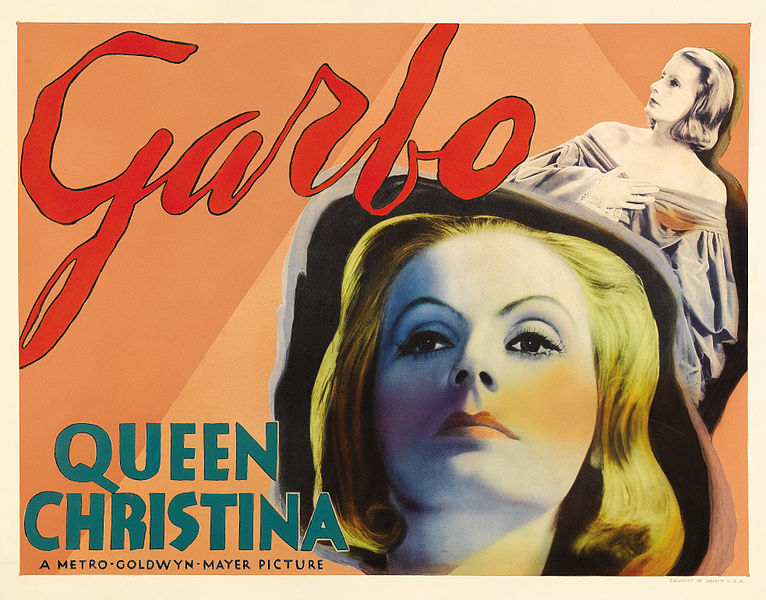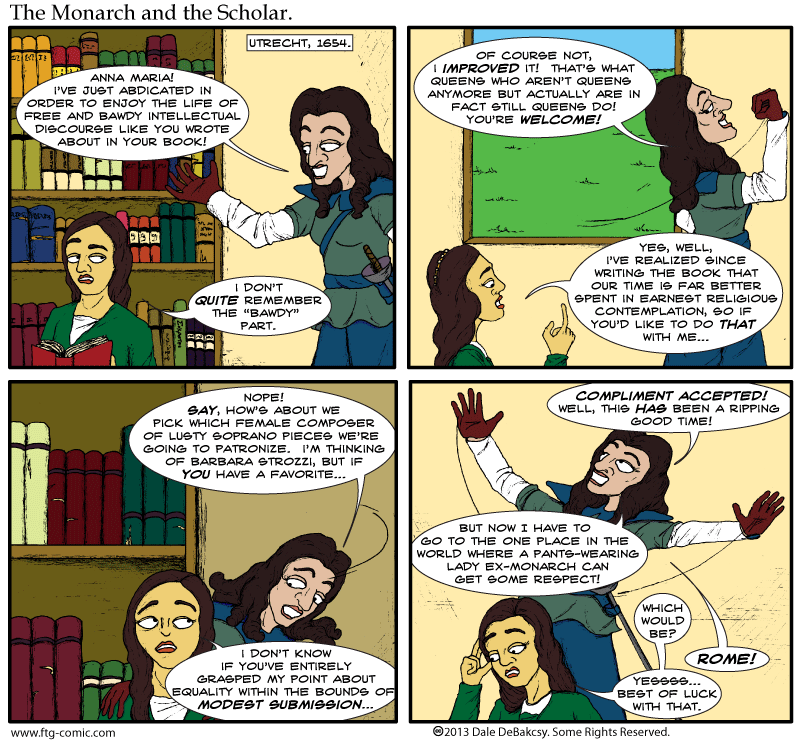Guest Post: Queen Christina, Anna Maria van Schurman, and the Not-Quite-Yetness of Seventeenth Century Feminism

Today’s guest post is by Dale DeBakcsy and combines an interesting story about independent women in history with a comic at the end. Basically, everything about this piece is wonderful, and you are missing something if you don’t take a minute to read through this.
——————-
A former monarch seeking adventure.
A brilliant polymath repenting of her worldly knowledge.
Few moments are more emblematic of the tenuousness of seventeenth century feminism than the 1654 meeting of two of the most remarkable and learned people of their age, Queen Christina of Sweden and Anna Maria van Schurman. They were in every way two ships passing in the night. Christina had recently abdicated her throne, seeking freedom to do and think as she pleased without the constant pressure to find a mate and produce an heir. Anna Maria van Schurman, meanwhile, after a life of scholarship lauded across the whole of Europe, was beginning the long process of retreating from her former claims in the name of sectarian religious fervor. Christina could have learned much from the encounter, about the demoralizing cost of compromise and the fragility of intellect confronting tradition, but she had a continent to conquer, or so she believed.
The two would not meet again.
Christina was the daughter of Gustavus Adolphus, the mercurial monarch who reversed the tide of the Thirty Years’ War and gave Sweden a place at the power brokering table of Europe. Lacking siblings, she was raised to be a queen, and her tutors encouraged her various intellectual enthusiasms, from ancient languages to the balance of European power, philosophy to Italian art. At the same time, it was clear that there was something quite different about this princess. She took to wearing male’s clothing, loved rough soldier talk, and was keenly proud of her abilities as a horseman and hunter. She adored the complexities of intrigue even when she came out clearly the loser, and would spend a good deal of her life spinning wildly improbable plans for remaking the face of Europe. Nobody had ever seen anything like her, and anxiety ran high about just what she might do should the crown fall to her.
Which it did, and sooner than anybody had anticipated. At age 6, her father died. At 18, she assumed formal control of Sweden’s government. At 28, she renounced all responsibilities of rulership, but declared paradoxically that she still retained the title of Queen in spite of the abdication, and demanded of the Swedish parliament a lavish annual salary. Ruler of a Protestant nation, she had formed a plan to convert to Catholicism, be welcomed into Rome in triumph, and turn the prestige of that moment into a position of established importance from which she could continue to affect European politics and patronize the arts without all of the bother of parliamentary restraint, under which she bristled, or the need to give birth to a successor, which she found instinctually appalling.
Upon abdication, she flew from Sweden as fast as her horse could carry her, bounding about the different nations of Europe, preparing for her meeting with the Pope. And in the course of those first heady travels, she stopped in Utrecht to visit the most famous female scholar of her day, Anna Maria van Schurman.
Schurman was nineteen years older than Christina, and had long ago earned a reputation as a fierce mind. Fluent in Dutch, Hebrew, French, Greek, Latin, Chaldean, Arabic, Syriac, and a handful of other languages besides, she was also known as a fine artist and precise philosopher, with intellectuals as diverse as the arch-conservative Gisbertus Voetius and ultra-modern Rene Descartes falling over themselves to extol the power of her intellect. Her 1638 essay, Whether a Christian Woman Should be Educated, while not the fiery call to arms of, say, Lucrezia Marinella’s 1600 The Nobility and Excellence of Women and the Defects and Vices of Men, was an influential piece that argued persuasively and logically that all women so inclined should have the benefit of the education that she herself enjoyed. The call for female scholarship was, of course, sugar-coated in a layer of “If you let them study, they’ll be better Christians and wives” reasoning, and the caveats were many, but as an exercise in pure, syllogistic reason on the side of feminine equality, it had no rival.

And yet, when Christina came visiting in 1654, Schurman’s star was decidedly on the decline. Her increasing fascination with Biblical linguistics and pietistic practice caused her to doubt her own earlier boldness and to eschew the modern philosophy of some of her proponents. Descartes, on his way to become Christina’s tutor in 1649 (an appointment that would end in his death at the hands of Sweden’s climate, Christina’s rigorous daily schedule, and his own insistence that brewed tobacco made for great medicine) stopped at Utrecht and couldn’t help but comment on the futility of Schurman’s belief that Biblical Hebrew held the key to anything worth knowing. She found his flippant dismissal of scripture thoroughly repugnant and turned her back completely on the philosopher who had once fascinated her.
She started to regard her previous attachment to learning as a wrong turn, a distraction from the real requirements of life. As she would later explain, “I do not deny that I had all my life placed much weight on bourgeois proprieties, customary manners, and a good name, as if true virtues: but in this case [her conversion to pietism in the 1660s] I paid no attention to them, I considered them transient in comparison with heavenly matters or as a heavenly gift and entrusted good which I could give back to God, just as everything that is mine belongs to God and has been given to me by God.”
Her quick intellect, her massive learning, were surrendered as sacrifices to the dictates of religious conscience. A decade after her meeting with Christina, she met Jean de Labadie, a charismatic pietistic preacher who convinced her to completely renounce her former life and follow him in creating a new religious sect. She died, still sacrificing herself to Labadie’s vision, in 1678.
And yet, if Anna Maria van Schurman was a Scared Straight example of what can happen when a great mind begins to doubt itself under the manically benevolent pressure of religious rectitude, Christina’s subsequent career is one of the dangers of naïve and unchecked ambition. She was received in triumph by Rome, but her extravagant generosity had rendered her penniless, and her status as a titular Queen without a country made her more often than not an embarrassment wherever she went. She burned decades of her life chasing phantoms of power, writing letters to the monarchs of Europe proposing grandiloquent plans that she no longer had the political or financial clout to make real. (My favorite of her schemes called for Cromwell becoming Catholic, giving England to the Pope, who would then give it back on condition of religious liberty being granted, at which point Cromwell would become King Oliver.) She would show up uninvited at the court of Louis XIV or back in her native Sweden, and was always entirely unaware of just how deeply unwanted she was.
And yet, the beautiful thing about Christina is that, no matter how many times she was put off by the crowned heads of Europe, no matter the volume of polite requests to Never Come Back, her self-confidence was so vigorous, her sense of worth so unbounded, that she was never broken by the insistently grinding machinery of European diplomacy. An entire continent brought all of its diplomatic wiles to bear on this one lone woman and she, through sheer force of will and character, always picked herself up unscathed to follow a new star.
And, in fact, it was Christina who lived to laugh last. Her finances eventually straightened out, she rented a modest estate near Rome where she spent her last years creating a small artistic garden of paradise amidst the stringencies of Pope Innocent XI’s reign. He meant to crack down hard on what he perceived as the decline in women’s virtue, ordering it illegal for any woman to take a music lesson from a male teacher, and strongly indicating it as preferable that women not learn music at all. Christina’s small estate, which as the dwelling of a titular queen was outside of the Pope’s jurisdiction, thus became a sanctuary for female performers and artists of all types, the instrumentalist Angelica Quadrelli actually living with Christina to escape Innocent’s plan of throwing her into a nunnery, while female composers were able to continue their work thanks to her patronage, including the great Barbara Strozzi (and if you haven’t tasted some of Strozzi’s compositions yet, might I suggest here as a good place to start?). Surrounded by paintings and music, friendship and intellectual stimulation, she finally succeeded in finding a life entirely to her temperament. When she died, Rome would throw itself into convulsions to pay her tribute. Gripe as the clerics might, the people really did rather love the odd Swedish former monarch who kept alive in their city a bit of the spirit of their ancient greatness, and who was entirely and always, herself.
We do not know what happened at Christina’s meeting with Schurman. They did not resume their connection, so presumably they didn’t hit it off. Christina doubtlessly struck Schurman as focused too much on matters of the mind and the world, while Christina’s brain was swirling too much with things of the future to be held back by the grim example of a once great mind voluntarily sacrificed at the altar of religious fervor. It’s tempting to see the moment as a passing of the torch, Christina continuing the work that Schurman was no longer willing to do, keeping the light of unchecked scholarship flickering even through the myriad defeats she experienced at the hands of an indifferent continent, preserving its promise for the coming century, one that would know its worth, and act on it.
Further Reading: Veronica Buckley’s Christina, Queen of Sweden is one of my favorite history books ever. Margaret Goldsmith’s earlier biography is also quite good, but Buckley crackles with a relentless, Christinian energy. For Anna Maria van Schurman, Joyce Irwin’s intellectual portrait that precedes her translation of Whether a Christian Woman Should Be Educated is rich with not only bits of Schurman’s life, but many other female intellectuals and artists of the time whose works are definitely worth the revisiting.
——————————
About the Author: Dale DeBakcsy is the co-creator of the twice weekly webcomic Frederick the Great: A Most Lamentable Comedy and a regular contributor to The Freethinker, Philosophy Now, and American Atheist Magazine. His blog, Twilight of the Nearly Everything, is all about humanism, culture, and stuff of a that-ish nature.






Incredibly enjoyable read, and not just because I think Queen Christina is rad and feel a tiny amount of national pride over her. ^^;
Nicely written on an amazing pair of people. Now, I gotta see Garbo in the movie. Perfect storm fodder. See how well she does it.